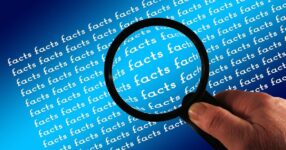
Filipinos wary over Facebook’s scrapping …
THE socio-civic arm of the Catholic Bishops’ Conference of the Philippines and other cause-oriented groups have expressed alarm over the recent plan of the tech giant Meta, the parent company of Facebook, to abandon its third-party fact-checking program.
“The removal of the fact-checking partnership is difficult in the Philippine social media information landscape, where revisionism, fake news, and disinformation abound. To remove the fact-checking initiative is like removing basic access to truthful information on social media, which is widely used by Filipinos to communicate with family and friends,” Jing Rey Henderson, head of communications and partnership development of Caritas Philippines, said on Friday, January 10, 2024, in an interview with SunStar Philippines.
“This development is also difficult for the country, knowing that we are a fragile nation in terms of good governance and politics, among other factors. We don’t yet know what the long-term effects of this will be for us as a nation. However, one thing is certain: this issue will have a significant impact on our education, politics, values, and sense of community, since social media will now be more open to lies, deception, and disinformation,” she added.
Dubbed the social media capital of the world, the Catholic-majority Philippines, with a population of 117 million, had 86.75 million Facebook users as of January 2024.
While Facebook usage is exceptionally high in the country, a separate public poll conducted by the Social Weather Stations in 2021 revealed that 51 percent of Filipinos find it difficult to determine “fake news” on social media, radio, and television, Catholic news site UCA News reported.
The Philippine-based advocacy group Movement Against Disinformation (MAD) also strongly criticized Meta’s recent decision to end its third-party fact-checking program.
“This shift in Meta’s approach to content moderation poses a grave threat to the already fragile information ecosystem, as it enables the unchecked spread of disinformation, putting society, democracy, and the rule of law at risk,” the group said in a statement.
“MAD urges Meta to reinstate its third-party fact-checking program and reconsider these misguided changes that threaten meaningful public discourse and truth. MAD further calls for stronger safeguards, expert oversight, and a renewed commitment to controlling harmful content to protect democracy and uphold the rule of law,” it added.
The artists and cartoonist group Pitik Bulag, a member of the #FactsFirstPH initiative, also slammed Meta’s decision.
“Putting community notes on Facebook posts is not a sufficient warning for users who are already struggling to discern what is true. While cartoonists experience arbitrary and wrongful takedowns of their cartoons posted on Facebook, we believe that Meta’s decision will overwhelm what remaining safeguards we have left against disinformation,” it said.
“Disinformation in Philippine social media has already had a terrible effect on Philippine democracy, evidenced by the ongoing harassment of journalists, activists, artists, and lawyers,” the group added in a separate statement on January 9.
In expressing their dismay, the group quoted Filipino Nobel Prize laureate Maria Ressa: “Without facts, you can’t have truth. Without truth, you can’t have trust. Without trust, we have no shared reality, no democracy, and it becomes impossible to deal with our world’s existential problems….”
“We stand with journalism platforms, civic-society organizations, and fact-checkers in condemning this decision by Meta,” Pitik Bulag said.
Facebook founder Mark Zuckerberg earlier announced that the company plans to phase in Community Notes in the U.S. first over the next couple of months and will continue to improve it throughout the year.
“As we make the transition, we will get rid of our fact-checking control, stop demoting fact-checked content, and, instead of overlaying full-screen interstitial warnings you have to click through before you can even see the post, we will use a much less obtrusive label indicating that there is additional information for those who want to see it,” he said.
As of January 2024, Facebook has more than three billion monthly active users, making it the most popular social media platform in the world. (Ronald Reyes/SunStar Philippines)



